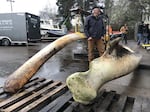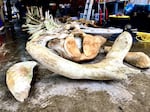As Lisa Ballance walks around a lengthy column of vertebrae inside a storage facility in Newport, the joy on her face is obvious.
“The last known blue whale record on record that stranded in Oregon was 200 years ago,” said Ballance, who is the director of Oregon State University’s Marine Mammal Institute. “And globally, I’m aware of only 21 skeletons of blue whales that are on display in the way that that we wish to do so.”

Frank Hadfield stands between the blue whale's mandibles (jaw bones) that are going to be loaded into a trailer and sent to East Coulee, Alberta where Dinosaur Valley Studios are based.
Brian Bull/KLCC
The blue whale’s 70-foot-long carcass washed up in Gold Beach, Oregon in 2015. Often whales sink to the ocean floor and are picked apart by predators and scavengers, making the odds of a nearly complete carcass being recovered exceptionally rare.
“It’s an exciting opportunity for us and we’re thrilled to make it happen,” Ballance said.
Scientists removed tons of flesh from the blue whale, before submerging the bones in Yaquina Bay for several years where natural scavengers helped clean them even further. After three years of being immersed, the bones were retrieved but the COVID-19 pandemic disrupted the project’s timeline.
As to the personal history of the mammal, Ballance said a necropsy indicated this male blue whale was sickened by domoic acid, a toxin from algal blooms. Blunt force trauma indicates it was hit by something huge.
“Ship strikes of large whales are quite common and a big problem globally these days,” Balance said. “We don’t know if it was hit by a ship before it died or after it died. Unfortunate for this whale, but very fortuitous for us in the world.”
Ballance said to date, people have donated a quarter of a million dollars towards the goal of putting the whale on display at the Hatfield Marine Science Center. The fundraising goal is $400,000.
A crew with Alberta, Canada-based Dinosaur Valley Studios recently power-washed the remains, before transporting them to Canada for finishing.
Meanwhile, Frank Hadfield, president of the company, said the whale’s cranium is so badly damaged that they’ll need to create a replica out of foam for the reconstruction.

The skeletal remains of a blue whale are arranged inside a Newport storage facility, March 23, 2023.
Brian Bull/KLCC
That won’t be too difficult, as Dinosaur Valley Studios also builds movie props.
“The next largest whale that we’ve articulated was a 60-foot humpback,” Hadfield said. “And we’ve done some large sauropod dinosaurs as well.”
There are at least 300 bones that Hadfield’s crew has to assemble and transport via trailer to their facility in East Coulee, Alberta. The number of bones and the fact some are damaged or missing presents a challenge to the construction process.
“But we’re sort of like mechanics of the bone world, we know where the parts go,” Hadfield said. “It’s like a car where whatever make it is at all has the same basic parts. And it’s the same with skeletons.”
Once the blue whale’s bones are disinfected, finished, and assembled, scientists say it will provide immense educational and research opportunities.